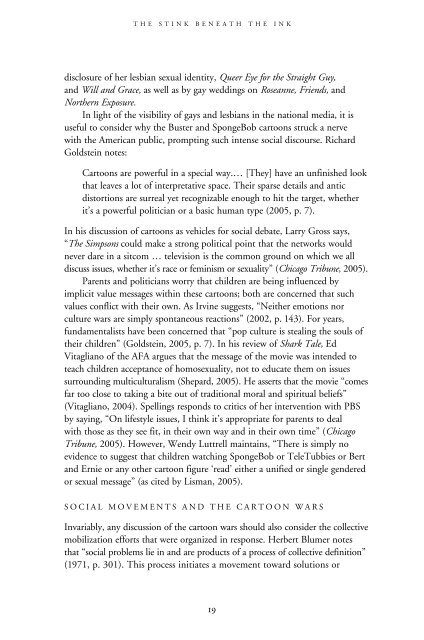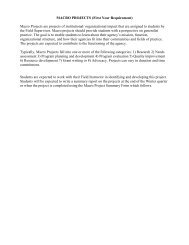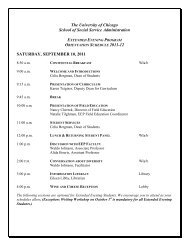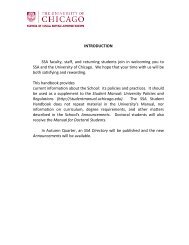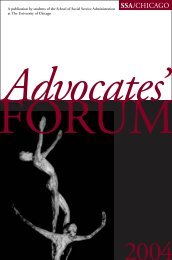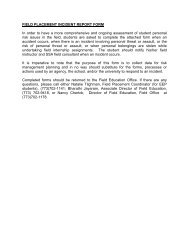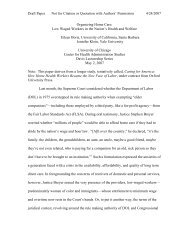2006 - School of Social Service Administration - University of Chicago
2006 - School of Social Service Administration - University of Chicago
2006 - School of Social Service Administration - University of Chicago
Create successful ePaper yourself
Turn your PDF publications into a flip-book with our unique Google optimized e-Paper software.
THE STINK BENEATH THE INK<br />
disclosure <strong>of</strong> her lesbian sexual identity, Queer Eye for the Straight Guy,<br />
and Will and Grace, as well as by gay weddings on Roseanne, Friends, and<br />
Northern Exposure.<br />
In light <strong>of</strong> the visibility <strong>of</strong> gays and lesbians in the national media, it is<br />
useful to consider why the Buster and SpongeBob cartoons struck a nerve<br />
with the American public, prompting such intense social discourse. Richard<br />
Goldstein notes:<br />
Cartoons are powerful in a special way.… [They] have an unfinished look<br />
that leaves a lot <strong>of</strong> interpretative space. Their sparse details and antic<br />
distortions are surreal yet recognizable enough to hit the target, whether<br />
it’s a powerful politician or a basic human type (2005, p. 7).<br />
In his discussion <strong>of</strong> cartoons as vehicles for social debate, Larry Gross says,<br />
“The Simpsons could make a strong political point that the networks would<br />
never dare in a sitcom … television is the common ground on which we all<br />
discuss issues, whether it’s race or feminism or sexuality” (<strong>Chicago</strong> Tribune, 2005).<br />
Parents and politicians worry that children are being influenced by<br />
implicit value messages within these cartoons; both are concerned that such<br />
values conflict with their own. As Irvine suggests, “Neither emotions nor<br />
culture wars are simply spontaneous reactions” (2002, p. 143). For years,<br />
fundamentalists have been concerned that “pop culture is stealing the souls <strong>of</strong><br />
their children” (Goldstein, 2005, p. 7). In his review <strong>of</strong> Shark Tale, Ed<br />
Vitagliano <strong>of</strong> the AFA argues that the message <strong>of</strong> the movie was intended to<br />
teach children acceptance <strong>of</strong> homosexuality, not to educate them on issues<br />
surrounding multiculturalism (Shepard, 2005). He asserts that the movie “comes<br />
far too close to taking a bite out <strong>of</strong> traditional moral and spiritual beliefs”<br />
(Vitagliano, 2004). Spellings responds to critics <strong>of</strong> her intervention with PBS<br />
by saying, “On lifestyle issues, I think it’s appropriate for parents to deal<br />
with those as they see fit, in their own way and in their own time” (<strong>Chicago</strong><br />
Tribune, 2005). However, Wendy Luttrell maintains, “There is simply no<br />
evidence to suggest that children watching SpongeBob or TeleTubbies or Bert<br />
and Ernie or any other cartoon figure ‘read’ either a unified or single gendered<br />
or sexual message” (as cited by Lisman, 2005).<br />
SOCIAL MOVEMENTS AND THE CARTOON WARS<br />
Invariably, any discussion <strong>of</strong> the cartoon wars should also consider the collective<br />
mobilization efforts that were organized in response. Herbert Blumer notes<br />
that “social problems lie in and are products <strong>of</strong> a process <strong>of</strong> collective definition”<br />
(1971, p. 301). This process initiates a movement toward solutions or<br />
19


